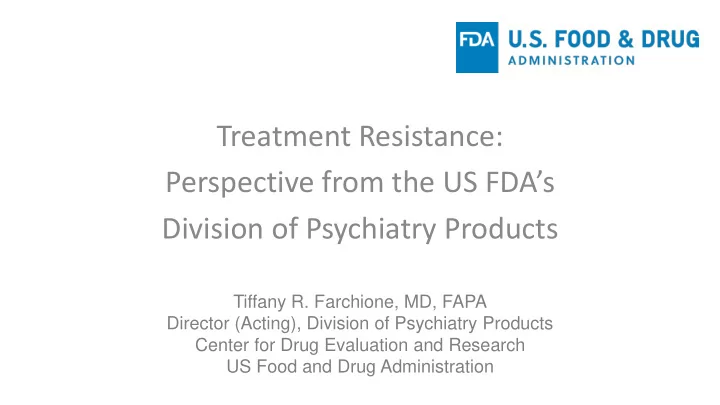

Treatment Resistance: Perspective from the US FDA’s Division of Psychiatry Products Tiffany R. Farchione, MD, FAPA Director (Acting), Division of Psychiatry Products Center for Drug Evaluation and Research US Food and Drug Administration
“Treatment Resistant” Indications • Clozapine: – Treatment of severely ill patients with schizophrenia who fail to respond adequately to standard antipsychotic treatment • Olanzapine/Fluoxetine combination: – Treatment resistant depression (Major Depressive Disorder in patient who do not respond to 2 separate trials of different antidepressants of adequate dose and duration in the current episode) • Esketamine: – In conjunction with an oral antidepressant, for the treatment of treatment-resistant depression (TRD) in adults www.fda.gov 2
Clozapine • Inadequate responses to at least three different antipsychotics (from at least 2 different chemical classes) during the preceding 5 years • The antipsychotic trials must have been judged adequate: – Dosages equivalent to ≥ 1000 mg per day of chlorpromazine for at least 6 weeks without significant reduction of symptoms • No period of good functioning within the preceding 5 years • Baseline score of at least 45 on the investigator-rated Brief Psychiatric Rating Scale (BPRS) • Also included a prospective, lead-in phase in which all patients received single-blind haloperidol (mean dose 61 mg/day) for 6 weeks www.fda.gov 3
Olanzapine/Fluoxetine • Non-response to two different antidepressants after at least 6 weeks at or above the minimally effective labeled dosage in their current episode – Defined by minimum HAMD-17, HAMD-21, CGI-S, or MADRS score, depending on study • 8-week open-label fluoxetine lead-in – < 30% improvement considered non-response • Randomized to combination vs olanzapine alone vs fluoxetine alone www.fda.gov 4
Esketamine • Inadequate response (≤ 25% improvement) to at least two different antidepressants of adequate dose and duration • Used the Massachusetts General Hospital – Antidepressant Treatment Response Questionnaire to assess adequacy of previous treatment • All patients also received open-label concomitant treatment with a newly initiated daily oral antidepressant (AD) (duloxetine, escitalopram, sertraline, or extended-release venlafaxine) www.fda.gov 5
2018 Draft Guidance • Expect rigorous (but practical) definition of treatment resistance – Patients who have not responded to more than one prior antidepressant, administered at an adequate dose and duration, should be enrolled in TRD studies. Patients should be randomized to either the new treatment or to continue the antidepressant to which they had failed to respond. • Conceptual distinction between partial response (adjunctive treatment) and non-response (treatment resistant) www.fda.gov 6
Recommend
More recommend